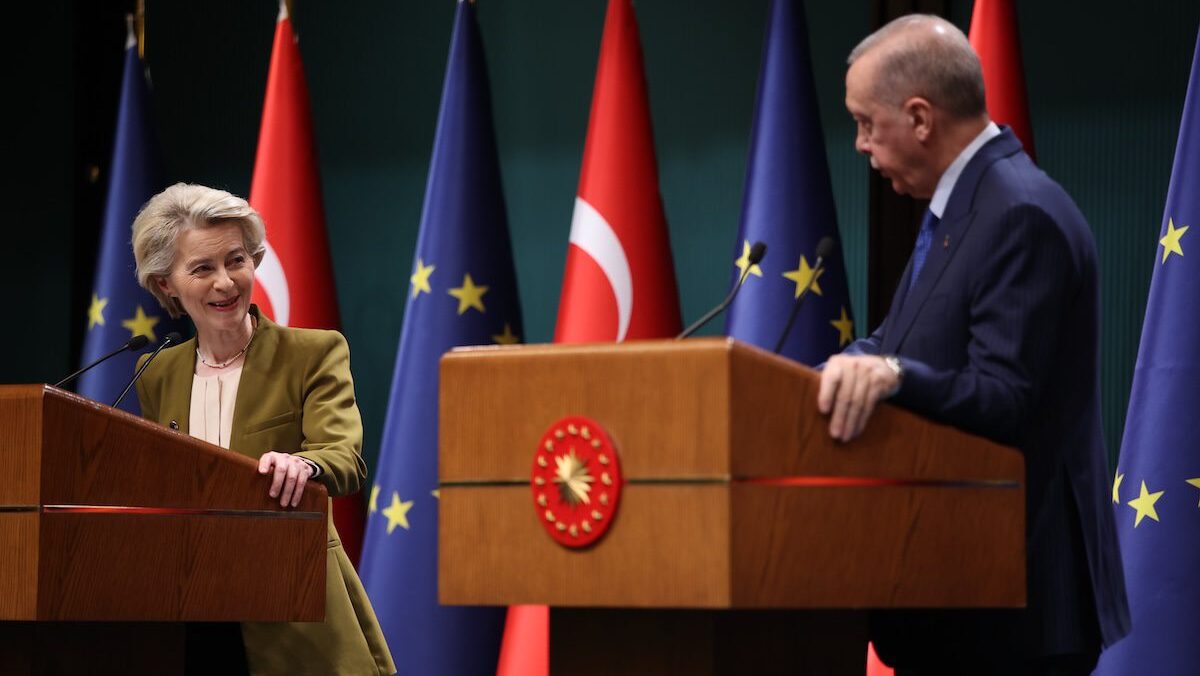
EU Commission President Ursula von der Leyen and Turkish President Recep Tayyip Erdoğan in Ankara on Tuesday, December 17th.
Photo: European Commission Audiovisual Service © European Union
When it comes to regional stability and preventing another migration crisis after the fall of Assad in Syria, Turkey suddenly became a lot more valuable to Brussels than before, as evidenced by EU Commission chief Ursula von der Leyen’s surprise visit to Ankara on Tuesday, December 17th, and the different tone she used when talking to President Erdoğan.
While there, von der Leyen announced that Brussels was giving €1 billion to Ankara to help with the migration and border management as well as to support the voluntary returns of Syrian refugees from Turkey. And that’s just the first tranche, with a possibility of more money coming in the near future.
“As things evolve on the ground, we can adapt this €1 billion to the new needs that might occur in Syria,” von der Leyen said.
But what truly shows the power of geopolitics is that, according to Erdoğan, the meeting included “steps on how to revive” Turkey’s EU accession process that’s been formally frozen since 2018 due to what the EU believes is a persistent erosion of democracy under the president’s leadership.
Knowing he has the best hand at the table right now, Erdoğan even called on the EU leaders to “remove all restrictions” in bilateral relations and to revive “all suspended high-level dialogues,” including on Turkey’s EU accession, as early as during the next EU Council summit on Thursday.
He also asked for updating the Turkey-EU customs union and granting visa-free travel to Turkish citizens into the EU.
The 🇪🇺🇹🇷 relationship is important.
— Ursula von der Leyen (@vonderleyen) December 17, 2024
Our economic relationship is growing stronger every year.
And Türkiye remain a key partner on migration.
An extra €1 billion for 2024 is on its way to support Türkiye’s efforts to host Syrian refugees. pic.twitter.com/cr3Tfaz7l9
Von der Leyen did not promise anything about this publicly, but she did signal support for Turkey in all other areas—including the potential Turkish invasion of Syria’s Kurdish-controlled territories.
Referring to Rojava—a de facto independent Kurdish-controlled state in eastern Syria that Ankara accuses of aiding Kurdish terrorists in Turkey—von der Leyen said that “Turkey’s legitimate security concerns must be addressed.”
This comes as reports emerge that Turkey and its affiliated militias are amassing troops and military equipment, including artillery near the Rojavan borders in what appears to be preparation for a large-scale invasion of the region, starting with the westernmost stronghold of Kobane.
The Kurdish civilian administration turned to U.S. President-elect Donald Trump on Monday in a desperate plea, saying the military operation appeared imminent and urging Trump to press Erdoğan not to send troops across the border.
Turkey’s goal is to “establish de facto control over our land before you take office, forcing you to engage with them as rulers of our territory,” Ilham Ahmed, president of Rojava’s Syrian democratic Council wrote to Trump in a letter cited by The Wall Street Journal. “If Turkey proceeds with its invasion, the consequences will be catastrophic.”
At the request of the Biden administration, the current ceasefire between the Kurdish SDF and Turkey has been extended by one more week on Tuesday. Despite the agreement, however, the SDS said Turkey began shelling the southern Kobane district with heavy artillery later that night, leading the Kurds to believe the invasion to be imminent.
#WASHINGTON—Senior #US officials say #Turkey and its militia Allie's are building up forces along the border with #Syria, raising alarm that #Ankara is preparing for a large-scale Incursion into territory held by #American-backed #Syrian #Kurds. ….. pic.twitter.com/3cA9O92bZk
— Mahalaxmi Ramanathan (@MahalaxmiRaman) December 17, 2024
